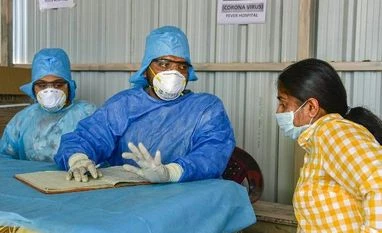So far, close to 80 countries, including India, have already reported cases of Coronavirus infection or Covid-19. In India, the number of cases has risen to 28, including 15 Italian tourists in the country.
Well, experts still believe that the virus can be contained, but there are several questions and a lot of confusion around Dos and Don’ts.
Here're the top 9 questions you always wanted to ask
1. How does Coronavirus spread?
The virus cannot travel by itself. Its most common carrier is respiratory droplets, or saliva.
So when an infected person coughs or sneezes, the ejected saliva droplets infect others in their vicinity.
To avoid infection, doctors recommend maintaining a distance of at least 1 metre (3 feet) from the sick person.
2. What are the symptoms of Coronavirus infection?
Unlike other life-threatening diseases, the symptoms shown in the Coronavirus disease are not distinct. They are more like common cold and cough — such as fever, dry cough, exhaustion, expectoration of mucus when coughing, shortness of breath, sore throat, headaches, muscle aches, chills. Some less frequent symptoms are nausea and vomiting, stuffy nose and diarrhoea.
Running nose is not a symptom of Covid.
3. Is there any treatment found to combat the virus?
Despite toiling hard, scientists have so far not been able to find proven drugs or vaccines for effective treatment of the disease.
4. What are Standard recommendations to prevent infection?
Standard recommendations to prevent an infection include washing hands regularly, avoiding close contact with anyone showing symptoms of respiratory illness like coughing and sneezing, avoiding frequently touching your face, and thoroughly cooking meat and eggs.
5. If you are suspected of infection but test negative, are you out of danger?
A single negative test may not rule out infection. Repeat testing may be necessary to determine if a suspected person has been infected or when a patient is no longer infectious.
6. Who is more prone to the virus?
According to a report commissioned by the World Health Organization (WHO), both men and women are equally prone to the infection. In China, where the virus was first reported, only 2.8 per cent of the infected women died from the disease, while 4.7per cent of infected men died.
The disease appears to be not more severe in pregnant women than in others. In 9 examined births of infected women, the children were born by caesarean section and healthy without being infected themselves. The women were infected in the last trimester of pregnancy. What effect an infection in the first or second trimester has on embryos is currently unclear as these children are still unborn.
Besides, the younger you are, the less likely you are to be infected and the less likely you are to fall seriously ill if you do get infected.
7. Can kissing an infected person lead to transmission of Coronavirus?
Kissing an infected person could definitely infect the other, according to a New York Times report quoting several experts.
8. Can you get infected from your pet?
According to WHO, there is no evidence that companion animals or pets such as cats and dogs have been infected or could spread the virus.
9. Is there any factor that triggers the spread of the virus?
Well, a new medical study published by medRxiv suggests that temperature factors could significantly change the impact of COVID-19, with the virus transmission increasing in places with lower temperatures.
)